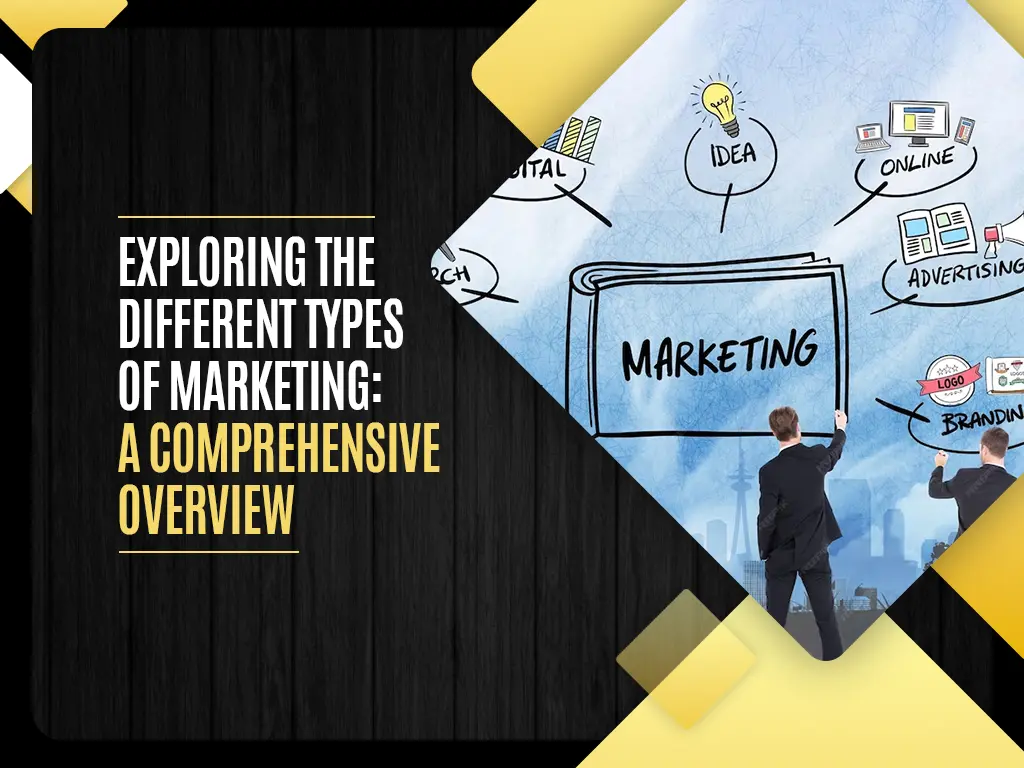Exploring the Different Types of Marketing: A Comprehensive Overview

The word “Marketing” is often used in business and is essential to any successful endeavour. It is the strategic driving force behind a brand’s ascent into customers’ emotions and consciousness. One must go through a variety of marketing methods in order to fully comprehend the nuances of this multidimensional industry.
In this blog, we explore how companies may engage with their audience as we dig into marketing. This thorough review will provide insight into the various Types of Marketing that influence the contemporary corporate environment, ranging from conventional channels to innovative digital strategies.
Table of Contents
Traditional Marketing: Time-Tested Strategies
Digital Marketing: Navigating the Online Frontier
Content Marketing: Crafting Compelling Narratives
Influencer Marketing: Leveraging Personalities
Event Marketing: Bringing Brands to Life
Affiliate Marketing: Collaborative Growth
Word of Mouth Marketing: The Power of Recommendations
Guerrilla Marketing: Creativity Unleashed
Traditional Marketing: Time-Tested Strategies
Traditional marketing is still powerful even with the digital world’s ever-expanding power. Print and broadcast media, the cornerstones of this strategy, still hold the attention of people all over the world. Radio, television, newspapers, and magazines continue to be powerful instruments in the marketer’s toolbox. These conventional channels are crucial parts of many marketing initiatives since they provide a concrete and recognisable way to connect with a large audience.
Digital Marketing: Navigating the Online Frontier
The relevance of digital marketing is becoming more and more apparent as we speed into the digital era. A key component of internet exposure, Search Engine Optimisation (SEO), makes sure that companies appear highly in search engine results. Another powerful tool is social media marketing, which uses the enormous audience that sites like Facebook, Instagram, and Twitter provide to interact with target audiences. With its personalised touch, email marketing creates a direct line of communication between companies and customers, increasing brand recognition and loyalty.
Content Marketing: Crafting Compelling Narratives
The art of storytelling is the foundation of many effective marketing techniques, and content marketing takes centre stage here. Companies become recognised as authority figures in their sector by producing and disseminating worthwhile and relevant material. Companies may communicate their story and establish a closer connection with their audience by using blogs, articles, videos, and infographics.
Influencer Marketing: Leveraging Personalities
Businesses are using the power of captivating individuals to promote their goods and services in the era of social media influencers. This kind of advertising profits from the confidence that followers and influencers have developed. By partnering with influencers whose principles mesh well with the brand, businesses may exploit an existing audience and establish trustworthiness and genuineness with customers.
Event Marketing: Bringing Brands to Life
Businesses look to Event Marketing for a fully immersive experience. Whether via product debuts, trade exhibitions, or guerilla marketing techniques, this strategy focuses on creating engaging, participatory experiences that captivate the viewer. Events provide consumers a chance to interact directly, giving companies an opportunity to build relationships that go beyond online.
Affiliate Marketing: Collaborative Growth
Affiliate marketing is a mutually beneficial partnership in which corporations work with people or other businesses to market their goods and services. A commission is paid to affiliates for each sale or lead they bring in. Through a network of partners, this advantageous arrangement enables companies to expand their reach and increase sales while rewarding affiliates for their efforts.
Word of Mouth Marketing: The Power of Recommendations
Word of mouth continues to be a powerful tool in the era of information overload. The natural dissemination of positive information about a product or service is the foundation of word-of-mouth marketing. Customer satisfaction leads to brand ambassadors who tell friends, family, and social media users about their positive experiences. These suggestions’ sincere and intimate quality adds a level of confidence that is difficult for conventional advertising to match.
Guerrilla Marketing: Creativity Unleashed
Guerrilla marketing is at the forefront of unusual marketing strategies. This strategy uses surprise and inventiveness to draw in viewers. Guerrilla marketing uses unique and out-of-the-ordinary techniques to create lasting impressions, from flash mobs to viral pranks. Businesses may create excitement without spending a large amount of money on advertising by thinking creatively.
Conclusion
The area of marketing is constantly changing as we get to the end of our investigation of the many types of marketing. Every marketing strategy has its own advantages, from the firm underpinnings of traditional marketing to the dynamic domains of digital marketing and guerilla marketing’s inventiveness. In a world where customer tastes and technology are always changing, a good marketing plan often entails striking a careful balance between these many components.
Businesses can create campaigns that appeal to their audience and leave a lasting impression in the cutthroat business world by knowing the subtleties of each kind. In all its manifestations, marketing continues to be a fascinating process that allows companies to share their narratives and establish deep relationships with their target audience.

